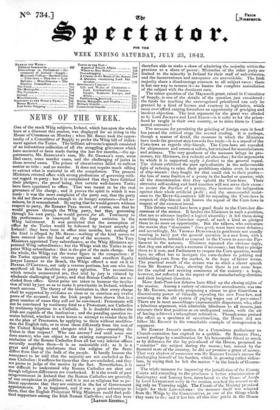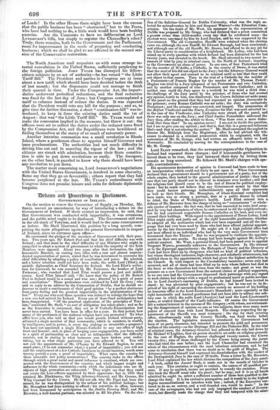NEWS OF THE WEEK.
ONE of the stock Whig subjects, Ireland, which has upon the whole been at a discount this session, was displayed for an airing in the House of Commons on Monday ; when Mr. SHEIL took the oppor- tunity of a Committee of Supply to prefer the Whig bill of indict- ment against the Tories. The brilliant advocate's speech consisted of an industrious collection of all the straggling grievances which have occurred or been made during the last few months,—the ap- pointments, Mr. BIDDULPH'S case, Mr. ST. GEORGE'S case, some libel cases, some murder cases, and the challenging of juries in those several cases. The prince of elocutionists failed to enliven matter so trite : and no wonder. It does not require much sifting to extract what is material in all the compilation. The present Ministers entered office with strong professions of governing with- out regard to party : but it is complained that they have forfeited their pledges ; the proof being, that certain well-known Tories have been appointed to office. That was meant to be the real gravamen of the charge ; and it proves the spirit in which it was made : it was the mere complaint of the party out, that the party in did not throw crumbs enough to its hungry retainers—Irish re- tainers, be it remembered. By saying that he would govern without respect to party, Sir ROBERT PEEL meant, of course, not that he would govern through the Whig party, but that,- -governing' through his own party, he would govern for all. Testimony to lkiA performance is conveyed by the huge omission in the Whig indictment. It was predicted that the assumption of office by the Tories would be followed by instant anarchy in Ireland : they have been in office nine months, but nothing of the kind is alleged by Mr. SHELL—nothing of the kind seems to have entered into the head of any of the accusers. The Tory Ministers appointed Tory subordinates, as the Whig Ministers ap- pointed Whig subordinates ; but the Whigs wish the Tories to ap- point Whig subordinates : that is the gist of the main charge. On the whole, the Whigs cut the worse figure in the comparison : if the Tories appointed the veteran partisan and excellent Equity lawyer LEFROY to the Bench, the Whigs offered a seat on it to Damn. O'Consatt, not only a veteran partisan, but one who has sacrificed all his faculties to party agitation. The accusations which remain unanswered are, that trial by jury is vitiated by wholesale challenging of juries, and that Roman Catholics are ex- cluded from office. Great pains are taken to humour the institu- tion of trial by jury so as to make it practicable in Ireland, without much success. The theory of the institution is, that every charge shall be supported by evidence so clear as to convince any twelve peers of the accused; but the Irish people have shown that in a great number of cases they will not be convinced: Protestants will not be convinced by testimony fatal to a Protestant, nor Catholics by testimony injurious to a Catholic. It is doubtful whether the Irish are capable of the institution ; and the puzzling question re- mains behind, whether it were better to attempt to render them fit on the plan of Procrustes, by applying to them without modifica- tion the English rule, or to treat them differently from the rest,of the United Kingdom and abrogate trial by jury—repealing the Union in that respect? Who can answer? and until some one does answer, who can object to the existing compromise ? The exclusion of the Roman Catholics from all but very inferior offices naturally mortifies them—it is an undeniable evil; as it is a great and glaring misfortune that the religion of the State differs from that of the bulk of the people. It hardly lessens the annoyance to be told that the majority are not excluded as Ro- man Catholics : it suffices for them that they are excluded, and they are prone to judge of the motive by the fact. Nevertheless, it is not difficult to understand why Roman Catholics are shut out though religious differences are overlooked. It is the result of past misgovernment in Ireland that the Roman Catholics are generally of one complexion in politics; and it is not as religious but as po- litical opponents that they are omitted in the list of Government appointments. It so happened, and it was a great advantage to them, that the English Protestant Whig Ministers could find poli- tical supporters among the Irish Roman Catholics; and they were
therefore able to make a show of admitting the majority within the province to a share of power: Ministries of the other party are limited to the minority in Ireland for their staff of subordinates, and the inconvenience and annoyance are unavoidable. The Irish majority share a disadvantage common to all subject races: there- is but one way to remove it—to hasten the complete assimilation of the subject with the dominant race.
The minor question of the May nooth grant, raised in Committee of Supply, is one of the details of the question just considered : the funds for teaching the unrecognized priesthood can only be granted by a kind of licence and courtesy in legislation, which must ever afford carping formalists an opportunity of grudging and insolent objection. The best argument for the grant was alluded to by Lord JOCELYN and Lord ELIOT—is it safer to let the priest- hood be taught in their own country, or to drive them to Conti- nental convents ?
The measure for permitting the grinding of foreign corn in bond has passed the critical stage the second reading. It is perhaps,. though a matter of detail, the measure in which the Ministers have made the greatest step towards free trade—it is a repeal of the Corn-laws as regards ship-biscuit. The Corn-laws are repealed. for shipmasters and common sailors, but retained for manufacturers and artisans. The very goodness of the measure brings its pro- moters, the Ministers, to a reductio ad absurdum ; for the arguments. by which it is supported apply a fortiori to the general repeal. The debate exhibited the pure agriculturists in the unfavourable light of refusing to relax their prohibitory claims even in respect of ship-biscuit : they fought for that small risk to their profits— the loss of some fraction of a penny in the bushel or quarter, with all the determination that they uphold the Corn-laws. Their obtrusive self-seeking and hard exaction will not serve their cause : to secure the fraction of a penny, they increase the indignation against their whole artificial profit, ; and the unsuccessful resist- ance to the HUTT-GLADSTONE bill for repealing the Corn-laws in respect of ship-biscuit will hasten the repeal of the Corn-laws in respect of the common bread. This debate would have been a good finale to the Corn-law dis- cussions of the seaion. It landed the Ministers in such a position, that not to advance implied a logical absurdity : it left them doing something towards Corn-law repeal, of such a kind as pledged. them to do more on opportunity. But the talkers, who caricature the maxim that "discussion" does good, must have more debates; and accordingly, Mr. TuosiAs Duricom BE (a gentleman not usually wanting in tact) put the general question in a new form with a long resolution, intended as counsel to the Crown to convoke Par- liament in the autumn. Ministers repeated the obvious reply, that they can advise such a recourse if necessary ; but that to pledge them to it now, and Parliament to reopen the Corn question, would have no effect but to instigate the corn-dealers to jobbing and. withholding corn from the market, in the hope of better terms. The practical result of the debate was to elicit a clever speech from Sir ROBERT PEEL, showing that there is yet some hope for the capital and reviving commerce of the country : a hope, however, not reflected in the aspect of the manufacturing-districts and their incipient disorders. More Anti-Poor-law debates have filled up the closing nights of the session. Among a variety of obstructive amendments, was one by Mr. Escort', modestly proposing a clause to give Guardians a discretionary power of virtually repealing the new Poor-law, and returning to the old system of paying wages out of poor-rates ! There are in most assemblages impracticable disputants, who, after a laborious argument, with admirable blindness to all reason, just reiterate their first position as an undisputed axiom, with the air- of having achieved a triumphant refutation. Though some praised the effort as a specimen of speechmaking, the House did not follow Mr. Escort. in his remarkable example of retrogression in argument. Sir ROBERT INGLIS'S motion for a Committee preliminary to Church-extension has expired in a quibble. Sir ROBERT PEEL; moved perhaps by consideration for his honourable friend as much as by deference for the lay priesthood of the House, promised to "consider" the subject during the recess ; but, moved by the financial state of the country, be did not promise a grant of money. That very shadow of assurance was Sir Rormar INGLIS'S excuse for discharging himself of his burden, which is growing rather ridicu- lous, by saying that he left the matter " in the hands of Govern- ment" !
The triple measure for improving the jurisdiction of the County Courts and extending to the provinces a better administration of Bankruptcy and Lunacy laws, introduced to the House of Lords by Lord LYNDHURST early in the session, reached the second read- ing only on Thursday night. The fiends of the Ministry promised largely for their Law-reforms : the measure itself was adopted from the Whigs by the Conservatives, as one of the things which they were to do ; and it has lain all this time perdu in the House
of Lords ! In the other Rouse there might have been the excuse that the public business has been "obstructed," but to the Peers, who have had nothing to do, a little work would have been bealthy exercise. Are the Commons to have no deliberation on Lord LYNDHURST'S bills, but simply to register the Chancellor's edict? Truly, there remains, both to the Government and the Parliament, room for improvement in the mode of preparing and conducting business ; which we shall be glad to see effected in the second ses- sion of the Conservative restoration.



























